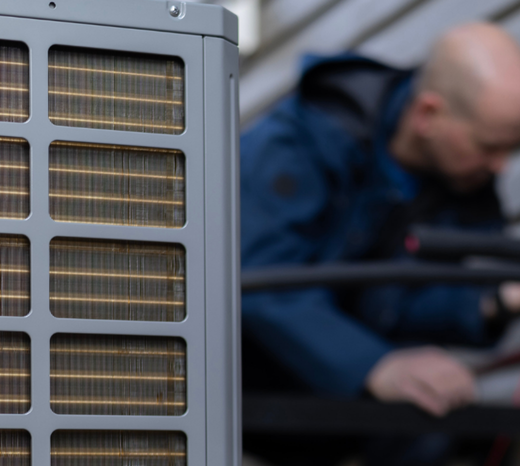As summer temperatures soar, your heat pump becomes the unsung hero of home comfort. Keeping it running efficiently isn’t just about staying cool—it’s also about avoiding surprise breakdowns and keeping energy bills in check. In this blog, we’ll share expert-backed heat pump efficiency tips to help homeowners maintain performance throughout the hottest months of the year. With a little maintenance and the right support from professionals like the team at Action Furnace, you can extend the life of your system and stay comfortable all summer long.
Schedule a Professional Tune-Up Before Summer Hits
The best time to service your heat pump is before the summer heat sets in. Annual maintenance ensures your system is operating safely and efficiently—and it helps you avoid expensive mid-season breakdowns.
A professional heat pump tune-up from Action Furnace includes:
- Thorough coil cleaning to improve airflow and performance
- Refrigerant level checks to ensure optimal cooling
- Inspection of all electrical components to catch issues early
- Calibration and performance testing for peace of mind
Routine maintenance for your unit will also help lower energy consumption, reduce wear and tear, and extend the overall lifespan of your heat pump.
Keep the Outdoor Unit Clean and Clear
Your outdoor unit needs space and airflow to function efficiently. Leaves, grass clippings, dirt and even nearby shrubs can block airflow, forcing the system to work harder.
Quick cleaning tips:
- Maintain at least 2-feet of clear space around the unit
- Trim nearby plants and bushes regularly
- Use a garden hose with a fan spray attachment to gently wash outdoor coils (no high pressure)
Keeping the area tidy is a simple, effective way to boost performance.
Change Air Filters Regularly
Clogged filters are one of the most common reasons heat pumps lose efficiency. When airflow is restricted, your system must work harder to cool your home—driving up energy use and reducing comfort.
Our recommendation: Replace your air filter every 1–3 months, depending on your home’s needs (pets, allergies, etc.).Clean filters also support better indoor air quality, helping trap dust, allergens and pollutants before they circulate through your home.
Ensure Proper Insulation and Sealing
Even the most efficient heat pump can’t keep up if your home is leaking cool air. Gaps around doors, windows, or attic spaces let heat in and force your system to work overtime.
DIY tips:
- Use weatherstripping around doors
- Seal window edges with caulking
- Add insulation to drafty areas
A well-sealed home keeps conditioned air inside, lightening your heat pump’s workload and improving comfort.
Clean Ductwork
Out of sight, out of mind—but dirty or leaky ductwork can waste up to 30% of your system’s energy.
When ducts are clogged with dust or leaking air into unconditioned spaces, your heat pump struggles to deliver consistent cooling. If your ducts haven’t been cleaned in a while, it may be time to call in the professionals at Action Furnace.
When you call Action Furnace for duct cleaning, expect:
- A full system inspection
- A full clean of every duct and vent in your home
- Replacement of existing furnace filters
- Clean, respectful and professional service
Your entire HVAC system will thank you.
Keep Indoor Vents Clear
Vents need breathing room. When blocked by furniture, curtains, or décor, airflow is restricted—and your heat pump won’t be able to cool your home efficiently.
Check all your indoor vents to ensure they’re open and unobstructed. Even small adjustments can make a noticeable difference in comfort and energy use.
Monitor Refrigerant Levels
Other important heat pump efficiency tips are keeping an eye on your refrigerant, and knowing when to call in professional help to address issues. Low refrigerant can silently sabotage your heat pump’s performance. It reduces cooling capacity and forces the compressor to work harder, which increases energy use and wear.
Signs of a refrigerant issue:
- Ice forming on the outdoor unit
- Warm air blowing from vents
- Sudden spikes in energy bills
- Reduced cooling performance
If you notice these symptoms, contact Action Furnace right away. Refrigerants should only be handled by certified professionals, and catching leaks early can save you from costly repairs.
Stay Efficient, Stay Cool
To keep your heat pump running at peak performance this summer:
- Schedule a professional tune-up
- Keep the system clean and unobstructed
- Replace filters regularly
- Seal and insulate your home
- Maintain ducts and vents
- Watch for refrigerant warning signs
We hope these heat pump efficiency tips have been helpful. Don’t wait for the heat wave to hit. Contact the experts at Action Furnace today to schedule your heat pump tune-up and enjoy efficient, reliable comfort all season long.

Frequently Asked Questions About Heat Pumps
How does a heat pump work?
In heating mode, it extracts heat from the outside air, ground, or water—even in cold conditions—and compresses this heat to a higher temperature before releasing it inside a building. In cooling mode, it reverses this process, extracting heat from the interior of the building and releasing it outside, thereby cooling the interior space. This cycle is facilitated by an outdoor unit (containing a compressor and a condenser coil) and an indoor unit (with an expansion valve and an evaporator coil), connected by a circuit of refrigerant.
What are the benefits of a heat pump?
Energy efficient: Heat pumps offer better energy-efficiency compared to many furnaces, which means you’ll use less energy throughout the year. And since they also act as an air conditioner, you don’t have to worry about the energy draw from two separate appliances.
Cost savings: Due to their higher energy efficiency, heat pumps can lead to lower utility bills over the course of year.
Environmental impact: Reduced energy consumption also means a smaller carbon footprint, so you can improve your home’s comfort while being green.
Dual functionality: Heat pumps provide both heating and cooling, offering a versatile home comfort power house.
